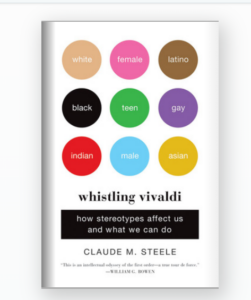Home » 2022 Spring
Category Archives: 2022 Spring
READING FIG SESSION III
During this meeting we focused on chapters 3 and 4 in the book.
We talked about how birth circumstances to some extent define your pathways in life. In this chapter Steele discusses how Anatole Broyard, born a black man, lived his adult life as a white man. This enabled him to enjoy different opportunities than he could of had he not “passed” as a white man. According to Steele as a white man he faced different constraints, different opportunities and traveled a different pathway He was the same person, but his social identity had changed and therefore his social location… Only the conditions he faced had changed.
This led to a lively discussion among the group. We all concluded that the book brought new ideas and the issues were worth further explanation.
READING FIG SESSION II
During this meeting we discussed chapter 2 and chapter 3. In this chapter Steel presented evidence of experiments that explored this topic. For example did the negative stereotype of women and math create pressure on women’s success in mathematics classes. In these experiments steps were taken to remove the effect of stereotypes and results seemed to indicate that the stereotypes do affect performance. We talked about experiences with the influence of stereotypes on performance. We discusses methods we could take with our students to counteract cultural stereotypes.
READING FIG SESSION I
During this meeting we discussed the introduction and chapter 1. All present had experiences with stereotypes affecting us personally and with our students. We also talked about how important it is to feel that you belong to do well in college. One of the biggest problems with the pandemic has been the isolation of our students from other students. According to Steel, minorities members often feel like they do not belong and this along with stereotypical messages that resonate internally lowers outcomes for students. We talked about different methods we can use to help our students feel connected to other students.
In chapter 1 (p 16-17) Steel discusses the inspiration for the name of the book :
Consider the experience of Brent Staples, now a columnist for the New
York Times, but then a psychology graduate student at the University of
Chicago, a young African American male dressed in informal student
clothing walking down the streets of Chicago’s Hyde Park neighborhood. In
his own words:I became an expert in the language of fear. Couples locked arms or
reached for each other’s hand when they saw me. Some crossed to
the other side of the street. People who were carrying on
conversations went mute and stared straight ahead, as though
avoiding my eyes would save them….
I’d been a fool. I’d been walking the streets grinning good evening
at people who were frightened to death of me. I did violence to them
by just being. How had I missed this…
I tried to be innocuous but didn’t know how…. I began to avoid
people. I turned out of my way into side streets to spare them the
sense that they were being stalked…. Out of nervousness I began to
whistle and discovered I was good at it. My whistle was pure and
sweet—and also in tune. On the street at night I whistled popular
tunes from the Beatles and Vivaldi’s Four Seasons. The tension
drained from people’s bodies when they heard me. A few even
smiled as they passed me in the dark. (p.17)
FACULTY READING GROUP -SPRING 2022
In the book, Whistling Vivaldi, Claude M. Steel provides well-researched information on how stereotypes act as a subconscious threat impeding academic performance. Steel suggests some simple techniques that can counteract these threats and help student reach their full academic potential. The intriguing title refers to the method used by a New York Times columnist to counteract negative stereotypes he faced because of his race. Please join the KCTL Reading Group and facilitator Amy Haas (Business) in reading this eye-opening and enlightening book.


